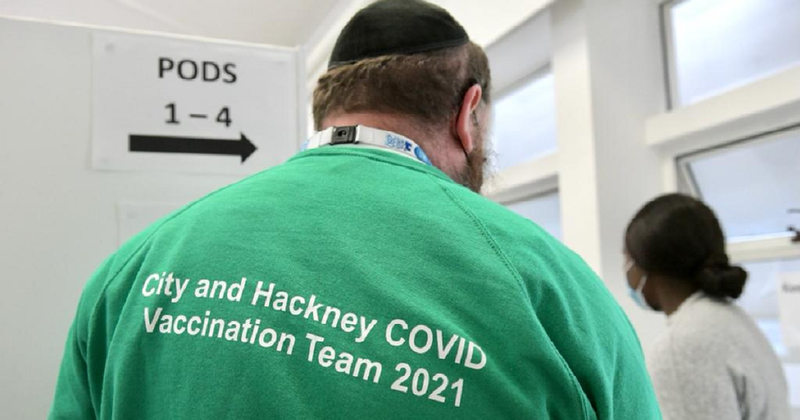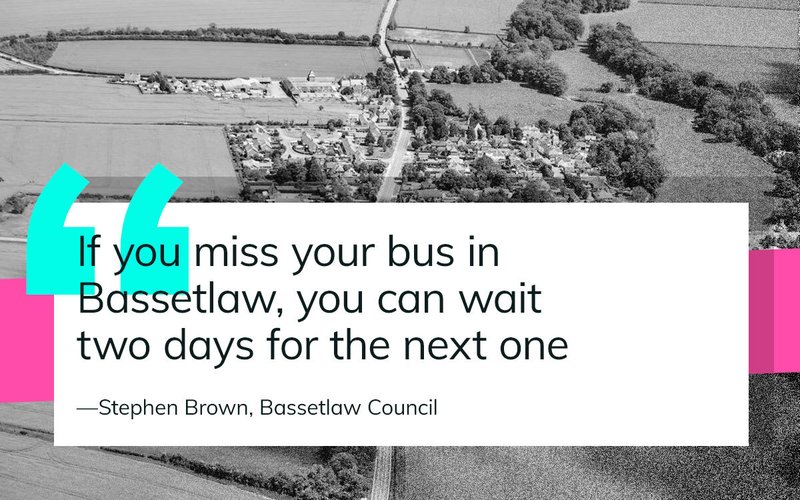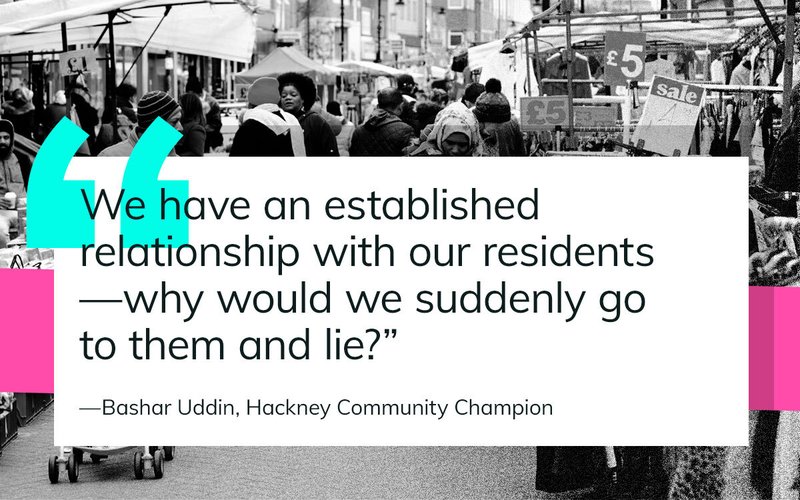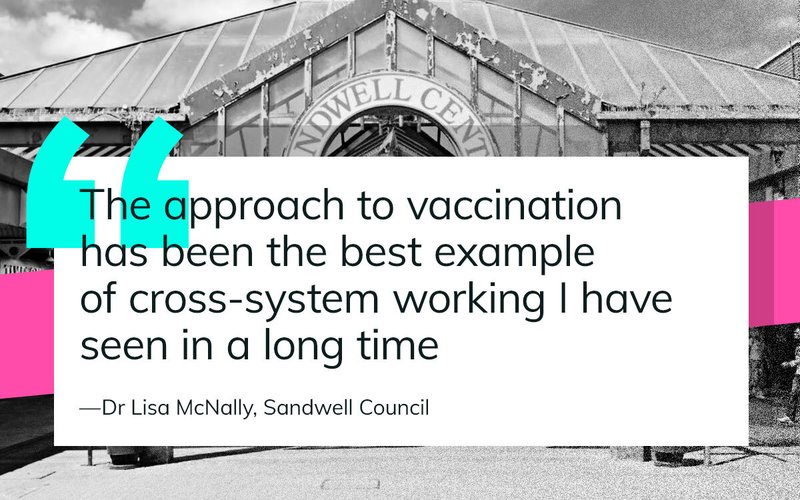‘Why would we suddenly go to them and lie?’: How councils and communities are working together to fight vaccine misinformation
In January, 60 councils across England were given money by the government to help spread Covid-19 vaccine advice through trusted “Community Champions”. We talked to some of them about what they’ve been doing, what’s been working, and the challenges ahead.

A volunteer at a vaccination pop-up clinic run by Orthodox Jewish medical emergency service Hatzola, in partnership with Hackney Council and the NHS. Credit: Greater London Authority
At the time of writing, the UK holds the enviable position of having administered more first doses of the Covid-19 vaccine per person than any country bar Israel, the Seychelles or Bhutan. It also holds relatively pro-vaccine attitudes.
Nevertheless, Peter Merrifield who runs Support When It Matters (SWIM), a Hackney-based community interest company, is worried.
“We seem to have been caught out and we’re behind the curve because there’s been sufficient time for conspiracy theories to run rife,” he says.
From outlandish falsehoods that vaccines contain microchips and a sinisterly named substance called “luciferase” (they don’t) to claims they will change your DNA (they won’t), vaccine misinformation has been a persistent and corrosive feature of the pandemic. Alongside more genuine concerns about vaccine safety and development, the success of the vaccine roll out depends on good information reaching the most sceptical.
To help, local authorities earlier this year received funding from central government to support networks of “Community Champions” who promote vaccinations in their communities.
But the most recent lockdown has made it difficult to spread good information, especially via physical one-on-one conversations that Merriman says older people prefer.
And this, in a way, speaks to the other big challenge facing the vaccine roll-out, which is sometimes overlooked: accessibility. Both in terms of getting good information to hard-to-reach groups and in getting people, especially the elderly, disabled and those in rural locations, into vaccination centres.
We spoke to Community Champions and council officials across England, to understand the challenges they’ve faced over the past few months, what they’ve done to increase uptake, and what lies ahead for the national vaccination programme.
Join 72,547 people who trust us to check the facts
Subscribe to get weekly updates on politics, immigration, health and more.
How to get there
“If you miss your bus in Bassetlaw, you can wait two days for the next one,” says Stephen Brown, Head of Corporate Services at the district council.
With perhaps a hint of often having to put his area into terms a clueless Londoner would understand, Brown explains that the footprint of the district which covers rural north Nottinghamshire would go from Brent Cross to Croydon but contains a population of only 116,000.
The government has committed to ensuring that everyone in England lives within 10 miles of a vaccination site. Currently the figure stands at around 99%.
But as vaccinations start to be offered to people beyond the initial nine priority groups, there is a risk that access becomes more difficult, not less.
This is because GPs can opt-out of the second phase of the vaccine roll-out— and there are reports that some will do so if they cannot balance vaccinations with a return to their normal workload.
This could mean more people living further from a vaccination site in future, posing particular problems for getting people vaccinated in rural areas.
“I’m concerned about the move away from GPs to large centres,” Brown tells me.
“Now it may be that there are a lot of them, but we will be lobbying for them to be accessible rather than be in Mansfield.” (Mansfield is up to an hour’s drive from parts of the district.)
Bassetlaw currently has three vaccination sites, but all are GP-led.

Accessibility is not just a geographic challenge. In Gateshead, a scheme to drive a 'vaccination bus' to help residents with learning disabilities is being considered.
“For them, it’s daunting to go to a new place,” Louise Harlanderson, a Public Health Practitioner at the council tells me.
For those who will travel to a site in person, the council is offering help with the practicalities for people who may be more comfortable going to their own GP surgery than a new vaccination centre.
“[We’ve] helped them understand where you can get a vaccine,” Harlanderson says, “how to get there, where to park, giving them a walkthrough of the building so they know where to go, explaining why they need to wear a short sleeve t-shirt, why you need to wait around for a while afterwards.”
In Blackpool, Community Engagement and Partnership Manager Chloe Pieri explains that one of the Council’s interventions which has gone down well with elderly residents is simply a map of the city’s large vaccination centre.
This may sound obvious. But it is important to make sure that people park in the right place and know where the entrance is when trying to keep a mass vaccination programme running to time.
“Someone said to me recently, that younger people like me and you would just turn up...but actually our grandparents are the generation that would do a test run before going somewhere new,” Pieri says.
Even in urban areas, accessibility is not a given. Just the mental hurdle of attending a vaccination in the circumstances can be a barrier.
Kate Wignall, who leads the Community Champions programme at Hackney Council, says “these people...at the beginning anyway have been shielding [and] not been out for such a long time. All of that incites uncertainty and anxiety about physically going.”
How to register
Councils must also make sure vaccines reach people who are not registered with GPs, a prerequisite for booking a vaccination.
In Bassetlaw, Brown explains to me, this is often a problem for the Eastern European residents, primarily from Poland and Romania.
"A lot of them aren’t registered with GP practices,” he says. “Many go home for healthcare because it’s more accessible.”
Brexit poses a mental, if not physical, barrier to access, with some feeling their new status might mean they need to pay for a vaccine, which is not the case.
To allay concerns, the council has been working with large local employers of Eastern European workers to reassure them that the vaccine is free—and that they will not face any financial penalty for taking time off work to get a vaccination.
Another group less likely to be registered are people seeking asylum. Hardlanderson talks about how Gateshead Council has been linking up asylum seekers and GPs to get them registered ahead of any vaccination callup.
And in the case of homeless people, who are less likely to be registered, these are sometimes the people most in need of vaccination.
Dr Lisa McNally, the Director of Public Health at Sandwell Council in the West Midlands tells me:,
“Many rough sleepers have pre-existing conditions and they are more exposed because they sleep in hostels where infection control may be hard.”
How to fight bad information
Concern around vaccines is the key factor hindering uptake in some parts of the country.
London accounts for all ten of the areas with the lowest first-dose vaccination rates in England among over 65s. Among over 80s the first dose vaccination rate in Central London stands at just 61.4% compared to 95.2% across England as a whole.
When I ask Peter Merrifield, and Ender Kukul, who works at a Hackney nursery with a high Turkish and Kurdish population, about the level of misinformation, they use the same word: “rife”.
This spans a wide range from reasonable concerns about vaccine safety and side effects to belief in wild misinformation and conspiracy.
Mistrust of authority is mentioned as a factor for certain communities. Merrifield says that people he has spoken to raise the case of French doctors last year suggesting vaccine trials take place in Africa, echoing historic cases of black people being used as the subjects of medical experiments.
From the council’s side, Wignall explains how people can mistrust authorities not only for trying to encourage vaccine uptake among ethnic minority groups but also for not directly prioritising them.“Some people will think, oh, you're targeting me to test the vaccine out on me, like you’re trying to kill us all off...
“And then on the other end, you might have people who say ‘You’ve said we’re disproportionately affected. You keep throwing this In the news that black communities are more disproportionately affected or at risk of COVID. However, you’re not prioritising us to go first…
“So it’s almost like you get sometimes you get polar opposites, within a very small kind of subset, even within, say, the Somali community or the West African community.”

The role of councils in convincing residents to get vaccinated is not so much to try and talk to residents directly, but to grow their networks of Community Champions, support them with resources like posters and videos, and let them decide how to share the information in their communities.
From Blackpool Council, Pieri tells me: “While there may not be a trusted relationship between the council and residents, there is with the trusted intermediaries.
“Videos of local people, well-known figures in the community, being the voice of what needs to happen [are going to work] much better.”
Bashir Uddin, a Community Champion and director of a housing association based in Hackney, which largely serves the borough’s Bangladeshi community tells me: “We … have an established relationship with our residents rather than someone unknown—why would we suddenly go to them and lie?”
In Gateshead, the council has put together vaccine information videos for circulation, but gets local Champions and community organisations to record a script which it then edits back into the videos to be circulated.
“We’re relying on our community contacts to know their own communities better than we can assume,” Harlanderson says.
In Gateshead’s large Orthodox Jewish population for example, low social media use means a focus on more traditional forms of communication. The council has supported community groups to run vaccine information in physical news bulletins, and in setting up a phone line with the latest information for residents.
By contrast, Uddin explains how, due to relatively high levels of digital penetration in the Bangladeshi community, he’s seen a good reception for NHS videos his team have translated into the Sylheti dialect. They’ve also been making new videos on vaccines tailored towards the community.
One carries testimony from a Bangladeshi doctor, a newly vaccinated elderly local resident, the Bangladeshi High Commissioner to the UK and an Islamic scholar, dispelling misinformation specifically targeted at Muslims that the vaccines contain pork and other impermissible substances.
Uddin and his team know that he is not the right person to talk to everybody his housing association serves. “In Asian families, men are the head of the household,” he says. “Our job is we want to talk to the woman of the house as well. The conversations will be completely different. You have got to have another woman talking to her. She can only express herself as she wants to another woman.”
Kukul runs weekly online drop-in sessions and an office-hours phone line for anyone who wants to understand more about the vaccine. Crucially for the largely Turkish and Kurdish population associated with his nursery, he’s able to speak to callers in Turkish.
He says that people who call “seem willing to kind of change their opinions. They seem malleable to what I’m saying.”
Though it’s difficult to quantify the impact of this support, Kukul tells me about a few cases where people have said to him “I wasn't going to get the vaccine, but after speaking to you, I decided that I'm going to go and get it now.” Although that's been “the minority of people,” he says.
Reflections
Despite all the work that’s happening though, there are still uncertainties around the vaccination uptake effort.
Many councils we approached for comment said they were still in the process of recruiting Community Champions, following the government’s allocation of the money in January.
This suggests that the programme could have been more successful in some cases if it had started sooner, given that the vaccine was already being rolled out in December.
As the health think tank the King’s Fund points out, local authority spending on public health has reduced by 15% over the last six years, against a background of reductions to local authorities’ budgets.
Some of the challenges are practical. “I still can’t get comparative [vaccination] rates in ethnic groups at a very small [geographic] level as I can at a high level,” McNally tells me, meaning it’s hard to know exactly where to focus effort.
And without a “control” group of people not being targeted with some form of vaccination messaging, it’s hard to get data beyond anecdotal evidence that specific efforts are “working”.

However, there’s an acknowledgement that even if networks of Community Champions take some time to be fully developed, they could still be useful after the vaccine roll-out winds down.
“It’s such an opportunity to expand the support mechanism,” says Pieri.
Uddin, who has been able to provide advice on Covid-19 with the help of a National Lottery grant, is planning to apply for another when funding ends, to support community mental health.
“Lots of people have lost their family and friends from Covid and they haven’t been able to say goodbye. That is emotionally draining,” he says.
In Bassetlaw, where links to Eastern European communities may not be as well developed as links between other councils and more established minority groups, Brown tells me: “Once the Community Champion programme has finished we want to not lose the work that’s been done.
“The danger is we can be complacent because we have a large white British population, but because the number of Eastern Europeans is small that can exacerbate their isolation.”
And, despite the challenges with the vaccination uptake effort, there is a lot of optimism for the work that’s being done.
“Public health isn’t a great career for people who like being a hero because the outcomes are so removed from the input,” says McNally.
“But yesterday a lady called my trying to get a vaccination for her young son with health issues and I managed to get one. I felt young again. It’s so energising. “
On working in public health during the pandemic she says: “There have been a number of very dark shadows.” But it has also provided some career highlights.
“The approach to vaccination has been the best example of cross-system working I have seen in a long time,”
“Everything we do, we feel we’re pushing against an open door.”